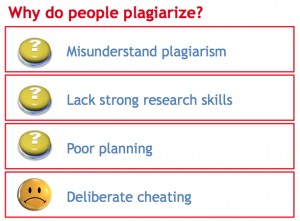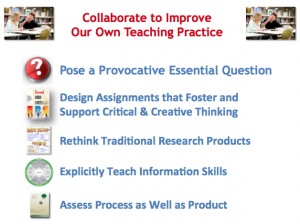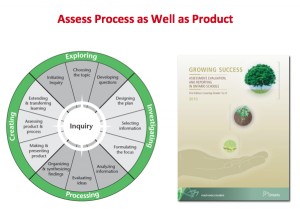Contents
- 1A Plagiarism-Proof Assignment:
- 1.1Poses a Provocative Essential Question
- 1.2Fosters and Supports Creative Thinking Through Instructional Design
- 1.3Rethinks Traditional Research Products
- 1.4Explicitly Includes Instruction on Relevant Information Skills
- 1.5Assesses Process as Well as Product
- 2Further Resources for Preventing Plagiarism
- 3Secondary Library Association Resources

Plagiarism can be a serious problem when it comes to research assignments. While some plagiarism is deliberate and calculated – a clear case of cheating – some people fall into the plagiarism trap. Unintentional plagiarism is often the product of lack of understanding, poorly-developed research skills, and poor time management.
Sometimes, however, plagiarism is invitational. A poorly-constructed assignment may unintentionally encourage students to copy and paste information and communicate it without real understanding, because that is all that is demanded of them.
The good news is that an assignment that is plagiarism-proof is also far more likely to foster deeper thinking and understanding in students. Well-constructed inquiry assignments offer opportunities to develop deeper understanding of overall expectations. So how do we create assignments that are plagiarism-proof?
A Plagiarism-Proof Assignment:
Poses a Provocative Essential Question
The assignment invites students to form an opinion – to take a stand and and back up their thinking with evidence from their research. For example, instead of asking students to do a project “about” Louis Riel, ask them the question, “Was Louis Riel a patriot or a traitor?”

Fosters and Supports Creative Thinking Through Instructional Design
If we want students to ask good research questions, then we need to intentionally help them to develop questioning skills and strategies. If we want students to understand issues from various points of view, we need to help them develop the strategies to find rich information. We can also provide graphic organizers to help them synthesize their thinking.
Rethinks Traditional Research Products
Instead of asking for a report, essay, brochure or poster, how about asking for a marketing proposal, an editorial, or a debate? Better yet, engage students in deciding the most appropriate medium for communicating their thinking, based on the topic, desired audience and text form?
Explicitly Includes Instruction on Relevant Information Skills
Students often plagiarize unintentionally because they have poorly-developed or undisciplined skills for research. They may not be finding the deeper resources needed to appreciate differing points of view on a topic. Their note-taking skills may be poorly developed. They may be inexperienced in developing deeper questions to fuel their inquiry. Students may not understand when it is appropriate to paraphrase or quote a source, and how to do it properly. They may not understand how to be accountable for their information through citation. They may not understand what information requires a citation and what does not. These are complex skills that need to be taught in a meaningful and relevant way, within the context of an inquiry assignment.
Assesses Process as Well as Product

The model for guided inquiry from Together for Learning offers many opportunities to use formative assessment strategies, providing some insight into students’ learning process and informing subsequent instructional approaches. Assessment of learning can occur not only at the end of the process – when the completed project is handed in, but at critical points along the way. Why not have students create an annotated bibliography during the research process, for example, and require students to use it to explain why the resources they have chosen are the best for their particular inquiry?
Further Resources for Preventing Plagiarism
WRSB Learning Services Consultants, Lisa Hicknell and Jillian Waters share tips to encourage Academic Integrity:
More information about planning for academic integrity can be found on the University of Waterloo website.
From the Research Section of the Library Learning Commons Website:
- Plagiarism
- Are These My Own Words?
- What Must I Cite?
- Quoting and Paraphrasing
- Tips for Using Quotations
- APA Citation
- MLA Citation
- Annotated Bibliographies
- Informal Citation
- Code of Digital Conduct
- Copyright Explained
- Copyright Definitions
- Copyright-Friendly Sources
- Note-Taking Checklist
- Note-Taking Templates
Secondary Library Association Resources
Secondary teacher-librarians have created a website with ideas and resources for creating plagiarism-proof assignments, within the context of guidelines for assessment, evaluation and reporting.
Visit the website at: https://sites.google.com/wrdsb.ca/plagiarismandacademichonesty/home
